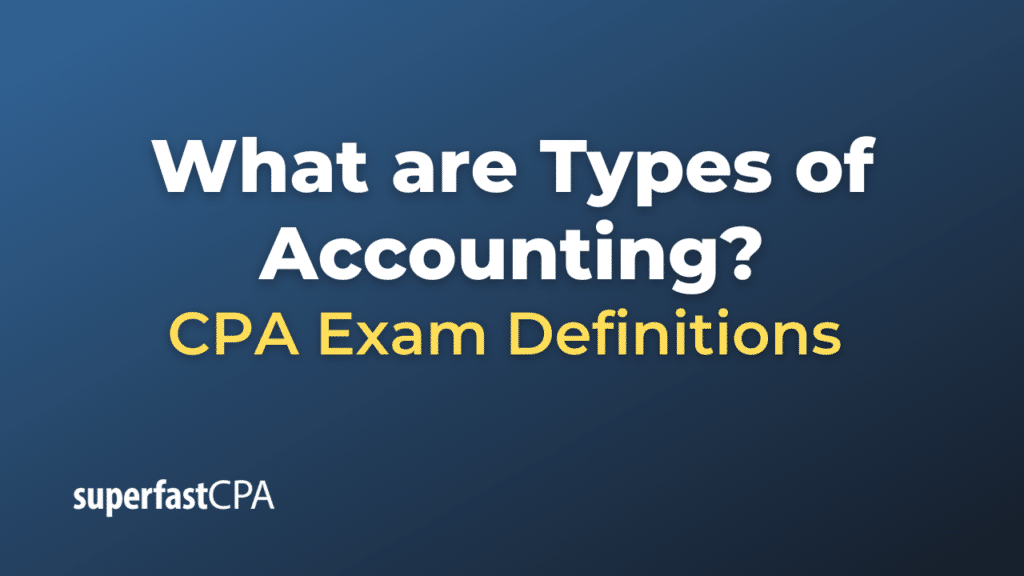Types of Accounting
Accounting is a multifaceted discipline that caters to various financial and managerial needs of individuals, businesses, and other entities. Here are some of the primary types of accounting:
- Financial Accounting:
- Focuses on providing external stakeholders like investors, creditors, and regulators with financial statements.
- Adheres strictly to standardized guidelines, like the Generally Accepted Accounting Principles (GAAP) or International Financial Reporting Standards (IFRS).
- Reports historical financial data.
- Management (or Managerial) Accounting:
- Designed for internal use by management for decision-making.
- Provides detailed financial and operational information, like budget forecasts, product profitability, and departmental performance.
- Less strict in adherence to standardized accounting guidelines since it’s intended for internal use.
- Cost Accounting:
- A subset of managerial accounting.
- Focuses on understanding the costs associated with producing specific products or services.
- Helps in determining pricing, budgeting, and identifying cost-saving opportunities.
- Tax Accounting:
- Deals with preparing tax returns and ensuring compliance with tax regulations.
- Ensures that all transactions are structured in a way to minimize tax liabilities.
- Auditing:
- Involves reviewing financial statements and processes to ensure accuracy and compliance with regulations.
- External auditors evaluate financial statements for shareholders, while internal auditors assess internal controls and processes.
- Forensic Accounting:
- Combines investigative skills with accounting to uncover fraud, embezzlement, or financial misrepresentations.
- Often used in legal disputes or financial investigations.
- Government Accounting:
- Focuses on the financial activities of government agencies and public entities.
- Adheres to specific governmental accounting standards rather than commercial ones.
- Project Accounting:
- Tracks and reports financial information related to specific projects or jobs.
- Common in sectors like construction or consulting where individual projects need financial monitoring.
- Non-Profit Accounting:
- Deals with accounting for organizations that don’t operate for profit, like charities or educational institutions.
- Focuses on ensuring that funds are used in alignment with the organization’s mission and in compliance with donor restrictions.
- Environmental Accounting:
- Tracks environmental costs, such as pollution control or waste management.
- Helps organizations understand their environmental impact in financial terms.
Each type of accounting has its own set of principles, guidelines, and objectives, tailored to the specific needs of the audience or objective it addresses.
Example of Types of Accounting
et’s provide a brief example for a few of the accounting types mentioned:
- Financial Accounting:
- Example: A publicly traded company, “Techtronix Corp.”, prepares its annual financial statements – the balance sheet, income statement, and cash flow statement. These statements are published in its annual report, adhering to GAAP, and are distributed to shareholders, potential investors, creditors, and other external stakeholders. They provide an overview of the company’s financial position and performance over the past year.
- Management Accounting:
- Example: The management of “Techtronix Corp.” wants to launch a new product and needs to budget for it. They receive a detailed report showing projections for production costs, marketing expenses, potential sales, and anticipated profit margins. This report helps them decide how much to invest in the product launch and set sales targets.
- Cost Accounting:
- Example: “Techtronix Corp.” manufactures smartphones. The cost accounting department calculates the total cost to produce each unit, considering raw materials, labor, overheads, and other direct and indirect costs. This information helps the company price its smartphones competitively and determine profitability.
- Tax Accounting:
- Example: At the end of the fiscal year, “Techtronix Corp.” hires tax accountants to prepare its corporate tax returns. These accountants ensure that all applicable tax laws and regulations are followed, identify eligible tax deductions and credits, and help the company strategize for future tax planning.
- Forensic Accounting:
- Example: There’s a suspicion that someone within “Techtronix Corp.” is embezzling funds. A forensic accountant is hired to scrutinize financial records, track suspicious transactions, and gather evidence that might be used in a potential court case.
- Government Accounting:
- Example : A city government needs to prepare its annual financial statements to show how funds were used across different departments, like public works, parks and recreation, and public safety. These statements adhere to governmental accounting standards and are audited to ensure public funds are used appropriately.
Remember, these examples are simplifications of real-world situations, but they provide a general idea of how different types of accounting are applied in practice.













